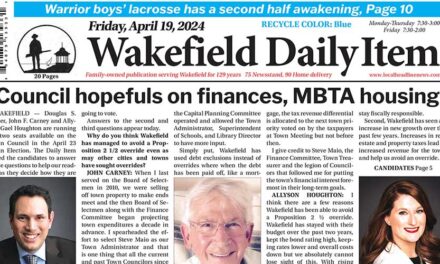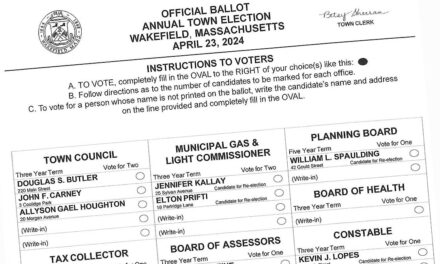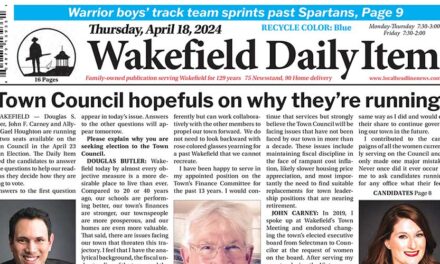WAKEFIELD — A Spaulding Street man who helped defeat a proposed downtown parking garage last spring has filed suit against the town and its officials in the wake of actions — or inaction — taken at the Nov. 17 Town Meeting.
In a complaint filed in Middlesex Superior Court, Robert Mitchell said officials violated the town charter in not allowing a motion to adjourn Town Meeting until the Planning Board heard a request to limit the height of a proposed Brightview Senior Living facility between Crescent and Main streets in the Assisted Living Overlay District to 30 feet.
Mitchell alleges town officials “did not act in good faith” when they refused to allow the Town Meeting to vote on the Plaintiff’s motion to adjourn Town Meeting to Dec. 1, 2014. His complaint asks the court to order officials to reconvene Town Meeting to hear and vote on Article 12, the Brightview height restriction request.
Town Counsel Thomas Mullen told Mitchell at the Nov. 17 Town Meeting that there was no guarantee the Planning Board hearing, which could go on for several meetings, would be concluded by Dec. 1.
Mullen also explained that even if it were possible to approve the height limit request, it likely would not affect Shelter Development’s Brightview project. Mullen said the developer has already taken steps to insulate itself from last minute zoning changes by filing a preliminary subdivision plan with the Planning Board. As long as Shelter follows up with a definitive subdivision plan, a process which Shelter has already begun, then the existing zoning is grandfathered for eight years, Mullen said.
The town counsel also suggested to those who supported the assisted living center’s height restriction that offering input at Zoning Board of Appeals hearings was a more effective way to approach concerns about a specific project than initiating a zoning amendment.
Mitchell was among the petitioners who unsuccessfully sought to eliminate the Assisted Living Overlay District from the downtown area earlier this year. However, he successfully fought a parking garage proposed between the Wakefield Co-operative Bank and Jeffrey’s Package Store.
Mitchell’s court complaint goes into the fact that Wakefield has open Town Meetings and all eligible residents are permitted to attend and to vote on all matters to come before the meeting.
“At the time of the Town Meeting on Nov. 17, the Planning Board had not as yet held a hearing on whether to recommend said zoning bylaw amendment as required by statute.
“As the Planning Board had not as yet held a hearing on the proposed zoning amendment, by statute the Town Meeting could not at that time affirmatively approve the proposed amendment.
“(Mitchell) sought to postpone any substantive vote on the proposed zoning bylaw amendment that evening that would be deemed a substantive disapproval and result in a statutory two year limitation from advancing the subject bylaw a second time.
“(Mitchell) timely moved to adjourn the Town Meeting until Dec. 1, 2014, thereby postponing any vote on the proposed amendment until such time as the Planning Board either voted on whether to recommend adoption of the proposed amendment or such a vote was no longer required by statute.”
According to Mitchell, Town Meeting Moderator William H. Carroll “ignored” his motion to adjourn and deprived the Town Meeting of the opportunity to adjourn the Town Meeting to Dec. 1, 2014.
Mitchell states in the complaint that the refusal by the town officials, “and more specifically the Town Meeting Moderator,” to permit a substantive vote on the plaintiff’s motion to adjourn was a violation of the Town Charter, and as a direct result to said refusal the civil rights of all eligible residents in attendance at the Town Meeting, including the plaintiff’s, were contravened.
“(Mitchell) alleges that the refusal by the Town Officials, and more specifically the Town Meeting Moderator, to permit a substantive vote on the plaintiff’s motion to adjourn was a violation of the Town Charter, and due to said refusal the vote by the Town on any matter relating to said Article 12 is a nullity and must be so declared by this Court,” according to the complaint.
Mitchell also alleges that other pending motions (not limited to a motion for Indefinite Postponement) were voted on in violation of the Town Charter and rules cited therein, which clearly states that a privileged motion of adjournment to a specific time is allowed and must be addressed ahead of substantive matters.




